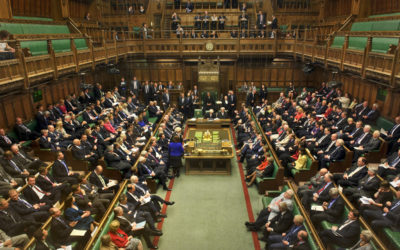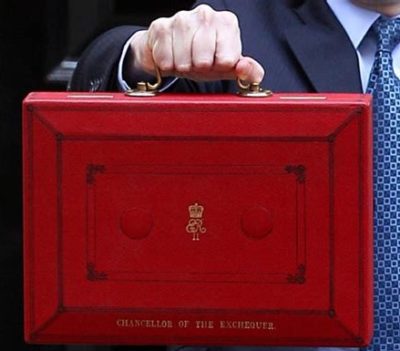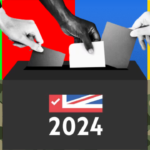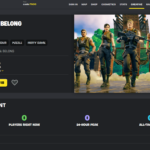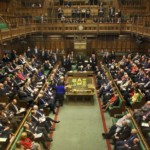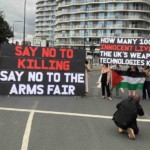The death and inquest of Geoff Gray
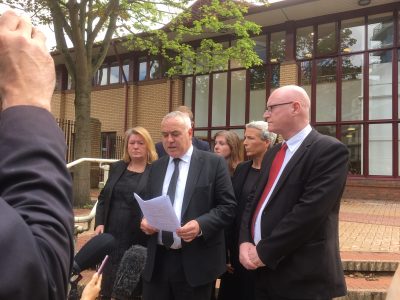
Geoff Gray’s death
It was a Sunday night in 2001, and the world was still reeling from the 9/11 attack just days before. The British military were on high alert, and diverse anxieties were pulsing through the country.
A military barracks near a Surrey village called Deepcut, was like elsewhere, on high alert. Then there were gunshots. Some remember a gap between the first two shots, followed by automatic fire. Some remember two shots. Some more. A soldier was missing. Searches ensued.
After almost an hour of failed searching, the body of Geoff Gray – 17 years old – was found dead, shot twice in the head. He had been on a lone patrol when he died. At that time, young trainees were still required to take part in armed guard duties.
Geoff was the third of four young soldiers to die there from gunshot wounds between 1995 and 2002.
Within hours of his body being found, the two teenage soldiers who had been involved in the search party that found him, were put on guard in the same place. Tissue and blood from Geoff’s body were still visible then, as indeed they were some weeks after his death.
This week, a second inquest into his death – long sort after by Geoff’s family – has concluded that Geoff killed himself.
The police and the army have always maintained that Geoff, like the other three Deepcut deaths, took his own life. They made this assumption almost immediately after the incident, in a manner that was heavily criticised by the Coroner Peter Rook QC, with the consequence that evidence was lost and lines of inquiry not pursued.
However, this conclusion was and remains disputed by Geoff’s family who believe their son was murdered.
A bungled investigation
In fitting with the pattern of how all the deaths at Deepcut were treated by the military and by the police, Geoff’s death was mishandled from the very beginning. Vital physical evidence which could have proved how he died was destroyed, ignored, mishandled.
In fitting with the pattern of how all the deaths at Deepcut were treated by the military and by the police, Geoff’s death was mishandled from the very beginning.
The inquest listed chronic failings in the civilian police investigation, including the decision not to hold a full forensic post mortem examination. The assumption was pre-emptively made that the fatal shots were self-inflicted and the autopsy was therefore routine and lasted only 30 minutes.
Testing his gloves or the sleeves of his jacket could have helped prove if he fired the weapon, but this was not done. Paperwork which would have shown who signed out the weapon found next to his body was routinely shredded without being examined.
The inquest uncovered a dozen ways in which the Surrey police force failed Geoff and his family after abdicating their responsibility to investigate. These failures included limited photography of the scene, no forensic assessment at the scene, his clothes destroyed without being examined, no forensic analysis of the weapon found next to the body nor of the cartridges, no mapping of the position of spent cartridges found at the scene, and inconsistencies in witness accounts not followed up.
Casting doubt on the suicide verdict
The inquest heard that there had recently been security concerns including a violent confrontation with an unknown assailant at the camp, and after the body was found, a group of trainees who had been searching were told to get down on the ground as the perimeter fence rattled ‘like somebody was trying to climb over.’
The camp was not a safe place for young soldiers. Even though bullying had already been identified as a significant issue, violent intimidation by staff was still happening. Despite previous deaths by gunshot at the barracks, inexperienced teenage soldiers were given live weapons to patrol the camp, with some reporting for guard duty after drinking. There was a clear propensity to violence including group violence, a culture of not reporting, alcohol abuse and self-harm. Surrey police reports show 327 significant incidents were logged over a six year period – 59 self harm, 95 assault and violence, 13 crime, 95 security 8 medical, 57 other. In 2000, two soldiers said they feared for their lives after a mattress was set on fire in their room.
While other recruits who died by gunshot wound at Deepcut had suffered horrific abuse and a culture that endangered the wellbeing of all the young people there, by all reports Geoff was not known to be at risk. No welfare needs had ever been identified for him, he was popular, there was no evidence of personal problems, bullying or unhappiness in his life. He was reportedly in high spirits after being praised by his superiors the evening he died. In reflecting on Geoff’s state of mind prior to his death, witnesses mentioned some small incidents that may have affected his mood but these were not indications of a suicidal intent.
Former Lt Col Ron Laden, who took over as commanding officer at Deepcut three months before Geoff was killed, said that unlike Geoff, ‘many of the other young men come from brutally disadvantaged backgrounds’ – and were therefore more vulnerable.
Professor Jack Crane, a forensic scientist with extensive experience in gunshot deaths, also said that it was unusual for Geoff to have shot himself in the forehead with a longish weapon. Professor Louis Appleby attested to the growing recognition of the vulnerability of adolescents to taking their own life without previous discernable distress or warning, although the coroner stated that it did not demonstrate that this is what happened in Geoff’s case.
State institutions shield themselves from scrutiny
Lt Col Laden said that the base was struggling under horrendous staffing ratios and cuts, which meant he drove his staff ‘to the point of physical and mental collapse.’ However, Laden also stated that he had felt betrayed – blamed – by the Ministry of Defence (MoD) as his employer: ‘you’re in command, it’s gone wrong, it’s your fault.’
He also reported that the MoD instructed him to try to convince Geoff’s parents, through the police, that their son ‘did have a motive to commit suicide.’ He refused to do so.
There was a meeting between Surrey police and the army in 2002 to discuss media attention following the death of James Collinson. Minutes show that they said ‘a main aim would be to prepare the ground for any call for a public inquiry to be defeated.’
The power imbalance
Our experience attending this and other Deepcut inquests was dominated by an overwhelming sense of the imbalance of power, which is heightened by the adversarial approach to finding the truth of what happened.
The MoD was represented by a team of top lawyers and the Surrey Police were similarly represented. Indeed the lawyer for Surrey police had also represented them at the inquests into the death of Cheryl James and Sean Benton, and also represented police superiors at the second Hillsborough inquest.
The counsel for the MoD has represented them in numerous major public inquiries, including the Baha Mousa Inquiry, the Detainee Inquiry and the Bloody Sunday Inquiry as well as individual inquests.
Meanwhile, Geoff’s family were represented by a legal team headed by John Cooper QC, relying on legal aid. The team, as of the beginning of June, had still not been ‘paid a penny’ for representing the bereaved. Compared to the huge sums of public money spent representing state institutions, and shielding them from accountability, this seems shockingly imbalanced and unjust.
Compared to the huge sums of public money spent representing state institutions, and shielding them from accountability, this seems shockingly imbalanced and unjust.
After fighting for justice for over 17 years – as long as Geoff was alive – his parents have no faith in the process anymore. Diane, Geoff’s mum, barely missed a day of the first two new inquests in to the deaths of two other recruits, Cheryl James and Sean Benton. She said:
‘The first thing they say is, it’s a suicide and let’s find out what happened later. I think the lies are not going to stop. I think it’s going to be lies from beginning to end.’
Speaking after the verdict, the family said they were shattered and did not accept the coroners conclusion of suicide. Diane Gray noted that the verdict was the decision of just one man, who thinks that Geoff killed himself when there is no proof. While the Coroner did not find evidence of involvement of another person in Geoff’s death, at the very least an open verdict (inconclusive) or one of accidental death could have been reached, which would more accurately reflect the lack of evidence available for certainty.
While the Coroner did not find evidence of involvement of another person in Geoff’s death, an open verdict (inconclusive) or one of accidental death could have been reached, which would more accurately reflect the lack of evidence available for certainty.
What have we learnt?
The Army has learnt many lessons from the scandals at Deepcut. Welfare for young recruits has improved significantly, and there are more systems and processes in place to try to deal with mental health issues and to ensure that bullying, harassment and abuse cannot be rampantly carried out with impunity.
However, many of the changes that needed to take place have happened far too slowly – and others, not at all. It was only last year that the military finally determined that no under-18s should carry out armed guard duty, in the same month that the inquest into the death of Sean Benton by gunshot started, despite post-Deepcut calls for change.
It was only last year that the military finally determined that no under-18s should carry out armed guard duty.
After the verdict yesterday, an Army spokesperson admitted that they took too long to recognise that ‘vulnerable’ young recruits should not be on armed guard duty. While we welcome the recognition throughout the Deepcut inquests that army trainees are particularly vulnerable due to their age and inexperience, we are less sure than the coroner that all the necessary improvements have been, or even could be, made in order for military environments to be suitable for very young recruits.
And when problems do occur, the system for dealing with them is dysfunctional. Concerns relating to the military justice system continue to be prominent to the extent that Liberty has this year launched a human rights helpline for military personnel.
This is prompting calls to address the issue of representation within the military (see our recent article on unionisation). Earlier this month, the European Committee on Social Rights again recognised trade union rights for military personnel though a ruling relating to part of the Italian military. To have the human right to self-organise for better working and living conditions, better welfare and better access to legal protection and justice, would transform the conditions of personnel – including those who are young and vulnerable. This would help address the primacy of operational interest over individual welfare that was admitted in evidence at Geoff Gray’s inquest by army head of personnel services Brigadier Christopher Coles, who was clear that ‘the needs of the army’, not the individual, come first when it comes to welfare.
As for the case of Geoff Gray, we are aware that his parents and their legal team may now seek next steps, and that for them, answers have still not been found. We will continue to support and listen to them, and hope that there may still be avenues to find out more about what happened to their son. Could a public inquiry into Deepcut be on the cards? We hope so.
Check out Deepcut Inquest for more detail about the case and the Deepcut Inquest podcast for in-depth discussion about the case and the wider context and implications.
See more: human rights, risks, Deepcut
Like what you read?
> Sign up for our newsletter or blog notifications
> Support our work – from just £2 a month

